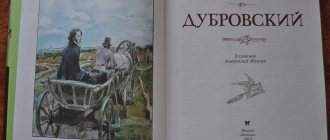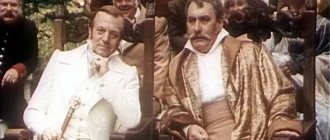In his work “Dubrovsky,” A. S. Pushkin tells the story of the dramatic fate of an impoverished nobleman who was illegally deprived of his estate.
The novel takes place in the Russian outback, where landowners Andrei Dubrovsky and Kirila Troekurov live next door.
They have a lot in common. Both come from old noble families, both served with the Tsar, where they were comrades. Having retired, they returned to their family estates, located nearby, “both married for love, both were soon widowed, both had a child left.” The characters of both neighbors, the landowners, were not distinguished by their complaisance: Dubrovsky was known as hot-tempered and impatient, and Troekurov was endowed with an “ardent disposition.” A certain similarity is also observed in their interests: for example, a love of hunting.
Both characters are nobles, but their position in society is not the same. Kirila Petrovich is extremely rich, has powerful connections, and provincial officials tremble at his name. Dubrovsky is ruined and does not play a significant role in the world. The heroes' lifestyle is also different: Troekurov whiles away his days at amusements and feasts, Andrei Gavrilovich is forced to lead a modest existence.
The morals of the landowners are strikingly different. Dubrovsky is a decent person. Despite his poor condition, he does not lose self-respect, does not fawn on anyone and always speaks the truth to his face. Dubrovsky behaves on equal terms with Troekurov, although he is much wealthier and more noble. As a noble nobleman, Andrei Gavrilovich treats his serfs in a demanding but fair manner. Dubrovsky condemns Troekurov’s cruel treatment of his domestic servants: “... the kennel is wonderful, it’s unlikely that your people will live the same as your dogs.”
Troekurov is arrogant and unceremonious even with people of high position. Kirila Petrovich is a tyrant: he mocks the serfs, mercilessly makes fun of the guests. After a quarrel with Dubrovsky, he, using his connections, takes away his estate using criminal methods. Troekurov forcibly gives his own young daughter in marriage to a fifty-year-old man, guided only by naked calculation.
Pushkin hated the Troekurovs, and treated landowners like Dubrovsky with respect.

